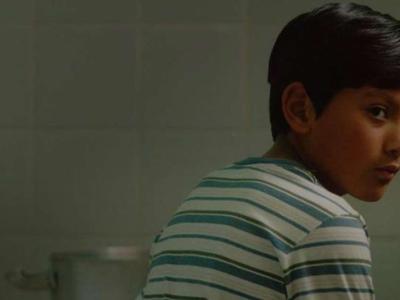'The Settlers' begins in 1901 in Chilean Patagonia when the wealthy Spanish landowner José Menéndez (Alfredo Castro) hires Scottish Lieutenant MacLennan (Mark Stanley) and an American mercenary, Bill (Benjamin Westfall), to clear a route to the Atlantic for the burgeoning sheep industry. They employ Segundo (Camilo Arancibia), a Chilean mestizo of Spanish and indigenous heritage as their guide, who involuntarily becomes complicit in the genocide of the indigenous Selk’nam people.
‘The Settlers’ examines the violence inherent in the creation of a white-settler nation state and the lawlessness required to draw frontiers and borders. Chilean director Felipe Gálvez, who before his directorial debut worked as an editor on various Latin American films, sat down with Latino Life overlooking the River Thames to talk about his provocative and visually stunning new film that has been touring film festivals worldwide.
Latino Life: How do you feel about your film being selected to represent Chile at the Oscars, considering it deals with such an uncomfortable matter in its history?
Felipe Gálvez: In terms of the film’s selection, it was more a filmmakers’ and technicians’ decision rather than political; 500 people from the Chilean film industry voted in total. I don’t believe the Chilean State had much to do with it. There’s no team of designated ministries involved in the decision-making, so it was chosen for other motives. This year there were three films that aspired to represent Chile at the Oscars, all three dealt with very important topics, so I think it was more because the Chilean film academy liked 'The Settlers' as a film. I do think that there was an awareness of the importance of bringing to light these issues when they voted for it, but it wasn’t a decision related to the Chilean state. I also think that there won’t be many more films about this issue in Chile. It took me 10 years to make this film, it’s a film with a huge budget for Chilean standards, especially for a debut film and it was very difficult to make it on location in Tierra del Fuego.

LL: My impression from the film was that a lot of the perpetrators of the genocide were foreigners, more than white Chileans, and even Menéndez is Spanish…
FG: The film takes place in Tierra del Fuego where, at the time, the Strait of Magellan, provided the only way to reach the Pacific Ocean. Many people had to pass through southern Chile on their way to the United States and the language that was spoken at the beginning of the nineteenth century in Punta Arenas was English, not Spanish. The Menéndez family spoke English at home. On the islands English was spoken more than Spanish.
MacLennan existed in real life, one of many foreigners who arrived in Chile. But more than wanting to make a film that showed foreigners participating in these crimes, the most important thing to me was to show how the Chilean state did nothing, despite knowing what was happening. José Menéndez was looking for someone who had a hand in the sheep industry and who knew how to use weapons, so he imported MacLennan, he’s not someone who just came to Chile, he was a mercenary.
For me, it matters less what nationality the characters are or who has committed these crimes. What’s significant is how the Chilean state was an accomplice - in fact they gave those lands to the same families who still own them today. I chose the character of MacLennan because he was a soldier. I was influenced by The Man Who Would be King by John Huston, Segundo is a mestizo in between two visions - that of the American, the cowboy, who represents capitalism and the New World, and that of this soldier who represents the Old World. So, it’s a way of looking at these two worlds that have influenced our nation-building.

LL: For a UK audience, a lot of people will recognise Mark Stanley from Happy Valley on the BBC and Game of Thrones, could tell me more about the casting process?
FG: Well as the film was a co-production with England, we did a casting here. Mark really wanted to participate in the film, with full understanding of how complicated it was going to be and that the shoot was going to be very difficult to execute. Mark is a very physical and energetic actor, and he was willing to do many of the things that had to be done. Horse riding, filming at night in the extreme cold, jumping into the sea almost naked, where the water and the wind completely freeze you, shooting guns on horseback - it was a shoot that really required a lot of commitment and confidence. I’m extremely grateful for having worked with Mark, because I don’t know of many other actors would be willing to face everything Mark dared to do. Our work was pretty collaborative and there was quite a lot of improvisation in many of the scenes. In the scene where he breaks Segundo’s morale, when Segundo wants to kill the woman, that was one of Mark’s improvisations. I told Mark to do what he thought was best and well, that’s what happened.
LL: What was it like writing and filming in two languages, Spanish and English, with this improvisation?
FG: It was crazy. I think it’s what gives a certain life to the film - because it lets things of the moment become part of the film. I tried to make the film feel alive. For example, in that scene that Mark improvised, I was going to film another scene that was in the script that I didn’t really think was going to work. I asked Mark to invent another scene with me and that’s how we came up with the one where Don Segundo breaks down, well Mark did all that. It was great.
LL: What are your hopes for how English audiences receive the film, and have you noticed an interesting difference in the reception of the film from audiences in Chile, in Europe and around the world?
FG: In every country there’s different reactions. In Canada and the US the audience laughed more, whereas in France there was a huge silence, as if it was all very serious. In countries that were colonisers, such as France and England, audiences interpret and read the film differently to audiences in countries that were colonised. I think that’s the main distinction. In Asian countries you notice there’s a lot of feeling when they watch the film. The audience in Taiwan for example felt that their history was very similar to that of Chile. The story of 'The Settlers' is really the story of the whole American continent, and it has a lot of resonance with things that happened in Asia and Africa too. Anyway, I’m not a psychologist - the film is more of a provocation, to move the water about to see what questions come out of it, what dialogues it can generate. I feel like the English have a long tradition of these types of films, not so much as a Western but as an adventure film, like 'The Man Who Would be King.'

LL: Did you want audiences in the UK to have more awareness of the UK’s colonial involvement in South America, which isn’t that widely talked about here?
FG: I feel like it’s a part of British history that isn’t studied or analysed much here, but for that reason I feel like a British audience can follow the story with interest, whilst already knowing the storyline, which isn’t that unique. You can recognise in MacLennan an archetype from English twentieth century adventure films, which I’m influenced by, and I feel like here there’s a tradition of those types of films.
LL: …which you think will help connect with the UK public?
FG: Well, the reception of the UK public has been good, though I don’t know if everyone laughed at the Scottish joke! I think it will have a good reception, partly because the film has a black humour which I think people like here. In fact I think it works better here than in many other places.
LL: Moving to the visual side of the film, what was your intention behind the early colour photography aesthetic, which gives it both a dreamlike and an archive-historical look?
FG: My first idea was to make the film in black and white, because the only images of the Selk’nam were in black and white, but I soon realised that it would be too realistic and I wanted to move away from reality, to be as far away from reality as possible, and for that reason the costumes had strong and strange colours. The idea was to construct an unrealistic-looking image. Visually, it’s a mix of the adventure genre, Mexican muralism and twentieth century painting. In my opinion, it’s the film’s image quality, as well as the music, that lets you enter the fictional dimension. I didn’t want the film to look like a documentary, I wanted it to be more like a thought process. In fact, the image gets increasingly destroyed; when you get to the last scene, the film is full of chromatic errors. It’s subtle, but the images are increasingly manipulated, and more and more reflections begin to appear, and each time it gives you the impression that they’re increasingly manipulated.
LL: Almost like the manipulation of history itself…
The Settlers will be in cinemas February 9 and streaming on MUBI from March 29















